If you buy an item via links on this page, we may earn a commission. Our editorial content is not influenced by commissions. Read the full disclosure.
Raising layer chickens is one of the best ways to provide for your own family. Not only are laying hens easy to care for, but they are also one of the least expensive types of livestock you can raise.
Plus, they are much smaller than most other farm animals and require minimal infrastructure.
No matter how long you have been raising chickens, though, there are certain frustrations that can appear. One of the most common sources of exasperation among homesteaders is the dilemma of chickens who like to eat their own eggs.
This is a problem that I have struggled repeatedly with on my own farm. When you raise as many chickens as we do – we currently have just over 75 laying hens – it can be tough to identify the main culprit behind the egg-eating and even tougher to eliminate the behavior.
However, in my years of raising laying hens, I’ve realized that there are usually a few common denominators behind the behavior. There are also some easy solutions you can incorporate.
Here’s what you need to know about chickens who eat their own eggs:
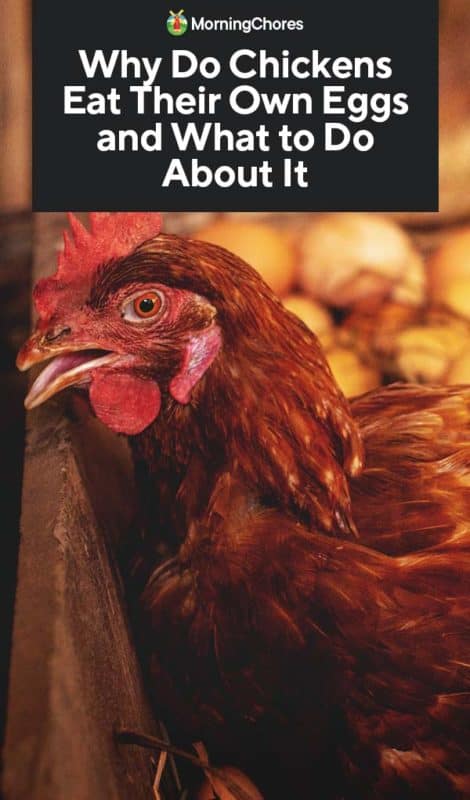
Why Do Chickens Eat Their Own Eggs?
1. Nutrient Deficiency
Calcium or protein deficiency is one of the most common reasons for egg eating. Even if you free-feed your chickens so that they can access food at any time, there is a chance that your chickens might not be getting enough vital nutrients. They may turn to egg eating as a result.
Calcium and protein aren’t the only nutrients your birds may be lacking. They might also be deficient in magnesium, phosphorus, or vitamin D.
Supplement as needed and know that egg-eating might be more common in the winter months or during times of inclement weather. Adding extra feed during these times can help alleviate egg-eating problems.
2. Broken Eggs
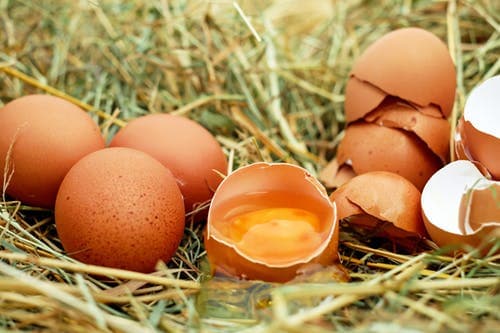
More often than not, egg-eating begins for no reason other than sheer curiosity. An egg gets stepped on, and a curious hen decides to take a nibble. It’s as simple as that. And once she gets a taste for eggs, she’ll go after them forever.
You can prevent egg eating by reducing the likelihood of broken eggs. Collect eggs frequently (this might mean several times a day) and make sure you have enough space in the coop and run. You also need plenty of nest boxes so the hens aren’t fighting for space in there, too. Make sure the nest boxes are filled with fresh bedding and that there is at least one box for every four to five hens.
3. Too Much Light
Hens prefer to lay eggs in dark, secluded areas. They don’t like bright light shining on them. If you use a light in your coop or even if your nest boxes are located in direct sunlight, it might be worth your time to hang a curtain over the nest boxes.
Not only will this give your hens the privacy they need to lie in peace (without excessive shuffling and moving that can lead to egg breakage) but the other hens won’t be able to see eggs that have already been laid. This will reduce the temptation to peck at it.
4. Dehydration
Chickens often eat their own eggs when they are dehydrated. Eggs contain a large percentage of water, so pecking at eggs is a good way for your chickens to hydrate themselves.
Luckily, this problem is pretty easy to diagnose and to remedy – simply add more water and watering stations to your coop.
5. Stress
Stress is a common culprit behind hens eating their own eggs. Identifying potential stressors in your chickens’ lives – from a lack of food and water to parasites or even predator pressure – can help you eliminate egg-eating behavior.
How to Stop Chickens From Eating Their Own Eggs
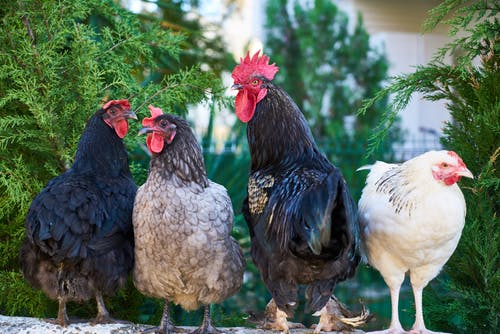
1. Add More Space
Here’s a simple solution to solve most egg-eating problems – add more space. Egg eating often results from broken eggs, so making sure eggs are rarely broken can help halt the behavior in its tracks.
Make sure you have at least one nest box for every four hens. These should be positioned off the ground and a decent distance away from your roosts. Give your chickens more space to roam in the run, too.
Egg eating can result from boredom, so giving the girls some space to explore can help ease their cabin fever.
2. Ensure Adequate Feed and Water
Make sure your chickens’ nutrition and hydration are in check. Switch to a higher protein feed, which can make up for some nutritional deficiencies. Protein deficiency is a common issue that leads to egg eating – your chickens aren’t getting something that they need.
If you use a homemade feed, that’s a great way to cut down on expenses and artificial ingredients. However, you need to keep in mind that many homemade rations do not have enough protein, so you will need to supplement it. You can raise mealworms for an additional source of protein.
The same goes for calcium. Make sure that calcium is being provided, ideally through the feed as well as through an oyster shell supplement. If the shells of your eggs are thin or flimsy in any way, that’s a good indicator that you aren’t giving your girls enough calcium.
Remember that often it’s not about what kind of feed you are using, but instead how much. Even if you have a free feeding policy, it is not uncommon for chickens to fight for space at the feeder.
You may find that your dominant hens prevent those lower on the pecking order from accessing food. This can lead to nutrient deficiencies, so keep an eye on your flock dynamics and provide plenty of feeding stations. To understand the pecking order better, read our post on managing bullying chickens.
3. Supply Some Toys
Chickens often eat their own eggs out of simple boredom. Adding some toys to the coop, whether it’s a few crickets or even a tetherball toy made out of a head of cabbage, can help alleviate this boredom.
Adding toys is a great fix during the cold winter months when outdoor free-ranging might not be possible or practical.
4. Change Your Bedding
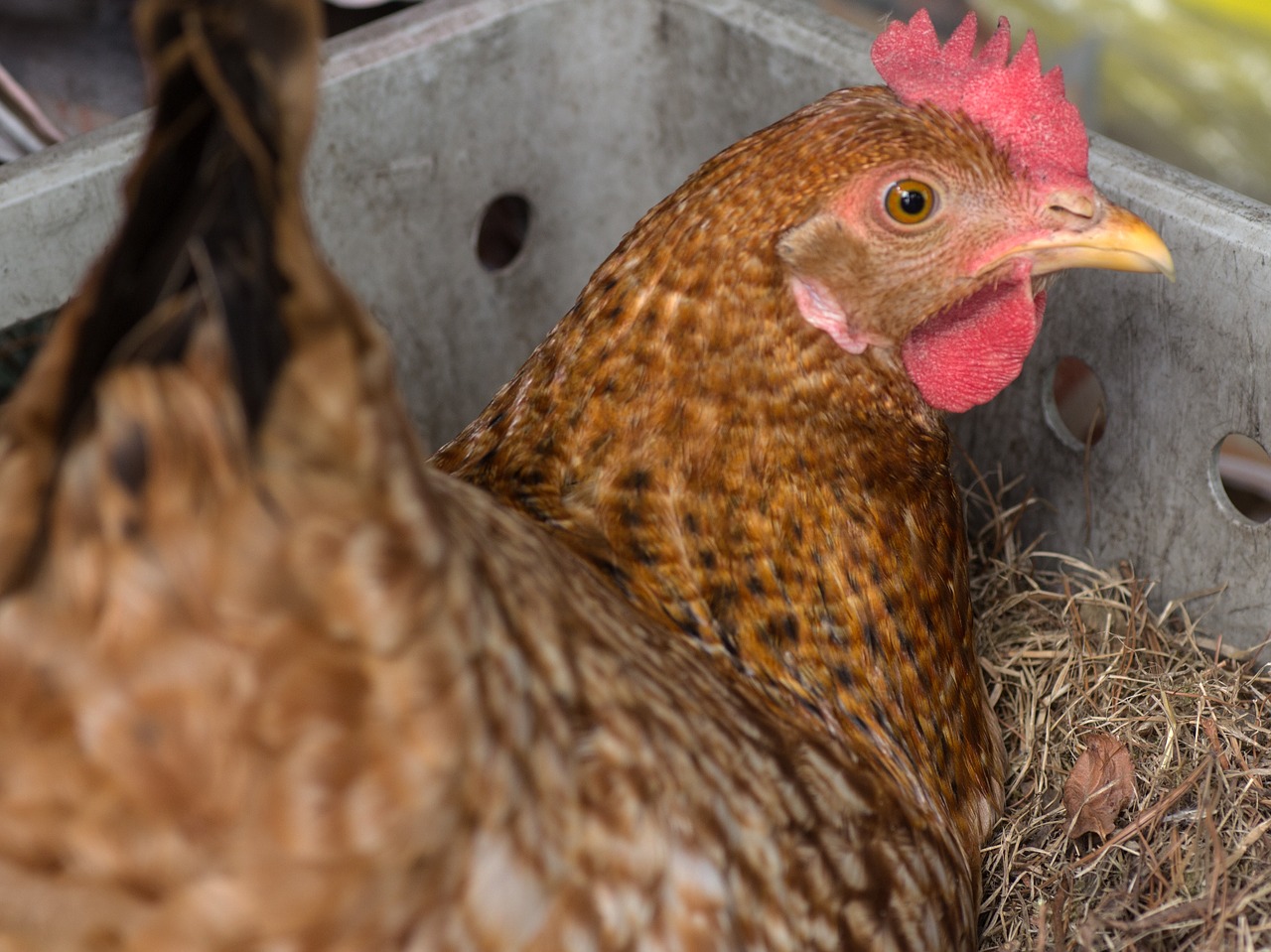
Make sure your nest boxes are in tiptop shape by adding quality bedding. Dirty bedding frequently leads to broken eggs, which can, in turn, lead to egg eating.
Make sure you swap out bedding at least once a week or consider investing in roll-away nest boxes. These have compartments that move the eggs away from the hen into a protected area as soon as it is laid.
5. Add Some Fake Eggs
If egg eating is a severe problem, you might need to employ the help of decoy eggs. Place a few fake eggs inside the nest boxes (you can purchase these online or you can use something as simple as a golf ball).
When your hens peck at the fake eggs, they will eventually learn that their beaks can’t get through the tough exterior. It will take all the fun away from trying to eat eggs!
6. Isolate the Perpetrators
If egg eating is severe, you may need to spend some time watching your flock to figure out who the perpetrators are. Remove any offending hens from the flock – the behavior is not going to stop any time soon. You can’t allow them to teach this behavior to the other chickens.
An adjacent issue to that of egg-eating is broodiness. Broody hens are often reluctant to leave the nest box, and there’s a chance that the other hens will fight her for her space.
This can lead to egg breakage and then, of course, egg eating. If you have a broody hen that just won’t move, consider relocating her to a new nesting area so that you don’t have to worry about her disrupting the other hens.
7. Be Careful Feeding Eggs
Many people feed eggshells or even whole eggs back to their hens. That’s not a bad thing. In fact, feeding eggs is a great way to recycle nutrients back into your chickens’ diets as well as to reduce food waste.
However, once your chickens get the taste for eggs, they’re never going to forget it. You need to make sure you make the eggs unrecognizable when you feed them back. Grind up eggshells into a fine powder and cook eggs when you feed them to your chickens. This way, your birds don’t develop a taste for the raw yolks.
Why Egg-Eating is a Problem
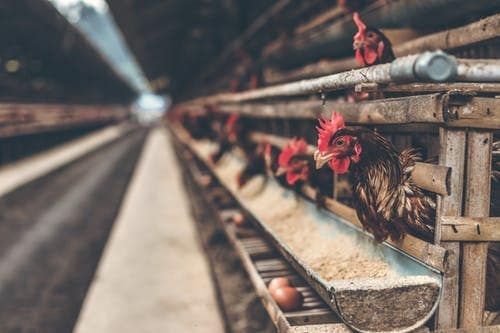
At the end of the day, egg-eating isn’t a minor concern, nor is it cute. And it’s definitely not a laughing matter! If you have hens eating eggs, it’s going to seriously cut down on your egg production. What’s worse is that if one begins doing this, it’s not going to be long before the others follow suit. You may find that your egg-laying halts entirely.
There’s nothing worse than feeding an entire flock of laying hens and getting nothing in return. Consider incorporating one of these easy hacks to prevent your chickens from eating their own eggs – it will pay off big time in the future.
